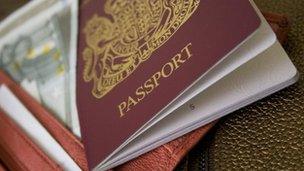New power to confiscate terror suspects' passports
- Published

Passports have been confiscated on public interest grounds 16 times between 1947 and 1976
Suspected UK terrorists face having their passports confiscated under new rules announced by the home secretary.
Theresa May said the move would prevent Britons travelling abroad to fight or attend terrorist training camps.
The Home Office says that passport facilities are "contrary to the public interest" for those whose activities are considered "undesirable".
Previously passports could only be withdrawn when a person's activities were "demonstrably undesirable".
The new rules give the government greater scope under the Royal Prerogative to restrict the travel of people intending to engage in terror training or extremist conflict.
According to the Home Office statement, passports will be removed from people "whose past, present or proposed activities, actual or suspected, are believed by the home secretary to be so undesirable that the grant or continued enjoyment of passport facilities is contrary to the public interest".
Guantanamo Bay
The statement said that "there is no entitlement to a passport and no statutory right to have access to a passport".
Under the Royal Prerogative the home secretary has the power to make decisions on the "issuance, withdrawal and refusal" of British passports.
The decision to confiscate a passport must be "necessary and proportionate" and the passport holder must be told the reason behind it, the Home Office said.
The new powers will be used "sparingly" after "careful consideration of a person's past, present or proposed activities".
The powers will target people travelling to carry out terror attacks but also those going abroad for "fighting, extremist activity or terrorist training" which may allow them to return to with the skills to plan an attack on UK soil.
As well as terror suspects the new rules will also apply to people suspected of serious and organised crime.
Until now there had been far greater restrictions on the home secretary's powers to confiscate passports on public interest grounds.
The rules stated that it could be done only "in very rare cases" where a person's past or proposed activities were "demonstrably undesirable".
The last time it happened was in 2005, when four returning Guantanamo Bay suspects had their passports taken away.
Before that, passports had been confiscated on public interest grounds only 16 times between 1947 and 1976.
Home Office officials say they expect the powers to be used more widely than previously but could give no estimate of the number of likely cases.
Currently, passports may also be taken away from those who are subject to a court order or who are bailed by police.
- Published27 September 2012

- Published28 March 2012
-jailedmarch2012(2).jpg)
- Published14 October 2011
